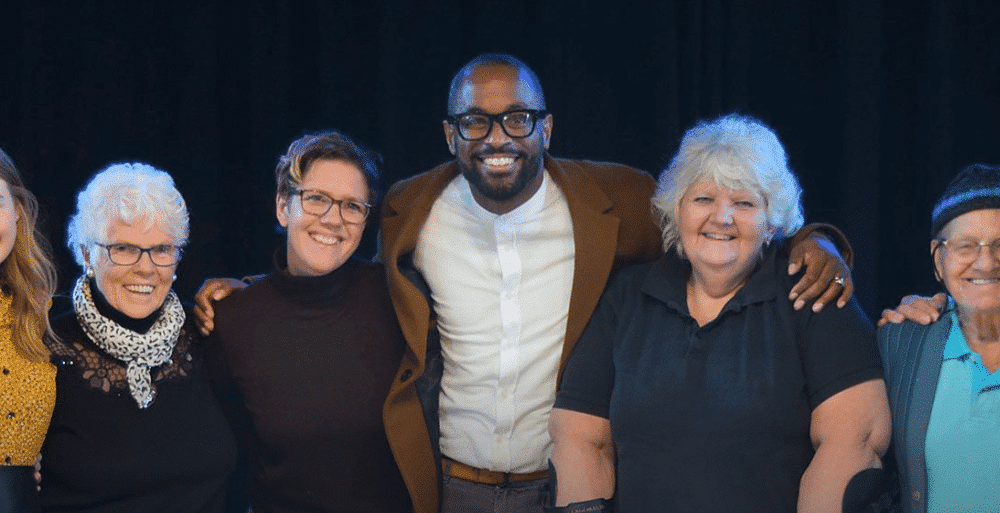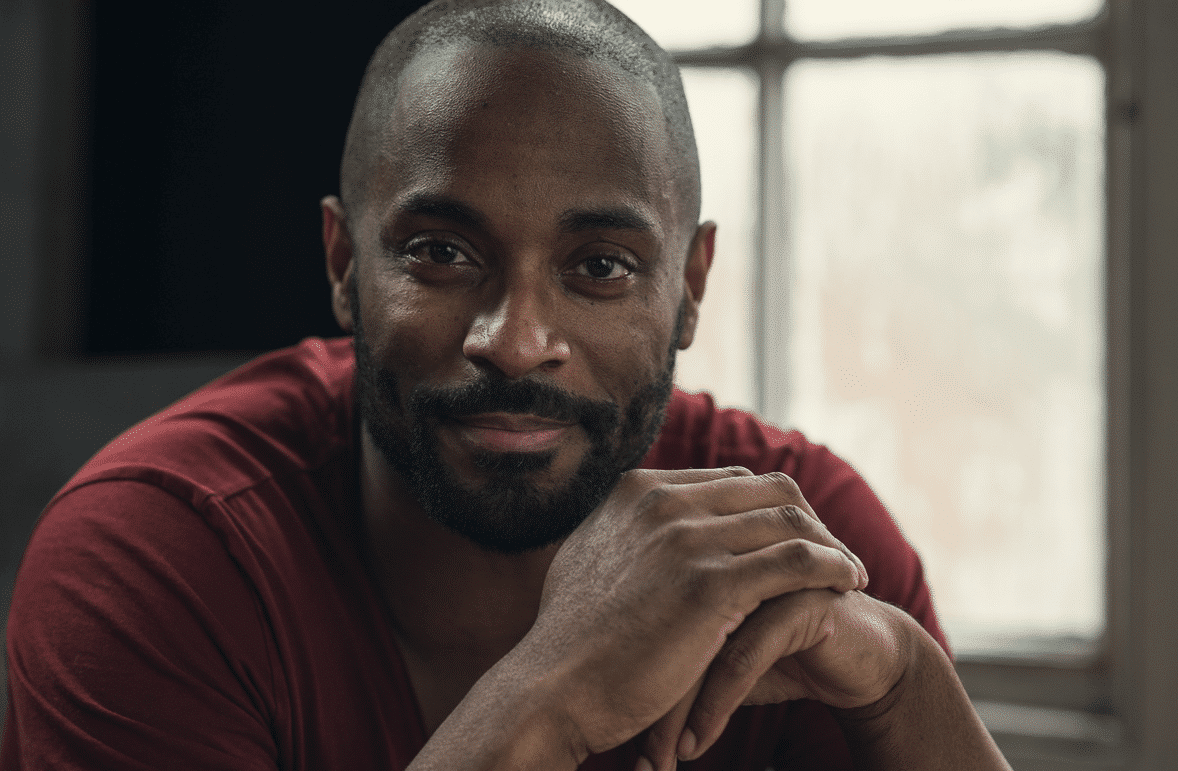Why singing is a miracle for your mental health
Culture
Vocal coach Mark De-Lisser is a legend in the industry and a man spreading the word of the confidence-giving power of singing.We had a sesh with him.

Not much fazes The Book of Man. Apart from war, violence, tidying, deadlifts, and any form of public expression. Singing fits firmly into the latter. Sure, after a few shandies every few years there’ll be a reluctant little duet on the karaoke machine, but mostly, it’s a big no. Even at the football, weddings, and Sunday showers.
So it was with the greatest trepidation that I headed to Croydon for a vocal session with Mark De-Lisser. Trying to warble out something from The Greatest Showman was not going to be very comfortable to say the least. But, well, it’s one of those where you have to take the opportunity to venture into the unknown – Mark is an industry great. A Brixton-born vocal coach who has worked with proper superstars, Ariana Grande et al, but is also an arranger (remember the gospel version of Stand By Me at Meghan and Harry’s wedding? That was him), a choral director (and founder of the award-winning ACM Gospel Choir), and behind-the-scenes whiz on TV shows like The Voice and The Masked Singer (amongst many others, but we’re sticking with The Masked Singer because we can’t stop watching it) – and he’s also the presenter of Meet the Street in which he brings isolated people in communities together into a choir to see how they can have their lives turned around.
Upon my arrival at his place, I tell him I’m scared, but Mark is keen to stress everyone can sing, including me. More than that. As he leads me into his studio at the back of his house, it’s clear that is one of those infectious people who are impossible to deny. I’d been planning on shirking the proper singing somehow by faking a cold, but it was never going to work: “You’re going to sing, Martin!”
We chat about our kids and about how much I hate my own voice. I don’t sing and I don’t like my speaking voice – too soft, no longer very Northern, not enough like Brian Blessed’s. According to Mark, traumas in life can affect the voice, not just overt criticism of your voice when you’re younger but trauma in general, which shuts people down, making them lose their voice. His work as basically a singing advocate is basically about reconnecting them with their voices. “What music do you like to listen to?”
Punk stuff I tell him. “Good – The Clash? Let’s try that – London Calling? Here we go…”
I’m taken aback. No show tunes, no classical…Mark whacks London Calling on Spotify, plays the chords on the piano and then encourages me to sing. I feel like a nob as I stand there waiting for the intro to end, but then once I start singing and don’t die of shame, it was fine, and then immediately addictive. The music was loud, the piano was loud, and Mark was going, “higher key…good!…higher key…yes!…ok, now louder…louder, Martin…yes!”
We did four or five run-throughs and quite honestly by the end I was singing my pretty little heart out with both fists in the air feeling about as good as I have in years. And I’m really not one to gush about such things. It was flippin’ ace. So good in fact that I later sang all the way home in the car, top of my voice, and for a couple of days later at home, much to the annoyance of my family – tough, it’s Daddy’s turn now.
After our sesh, I interviewed Mark about his work…
What can singing do for people? Can singing help your mental health?
As a voice coach I’m really keen on getting people back to this place where they can use their voices without judgment or fear. They can open their mouths for spoken word or a song. I want to them to get back to that place of total freedom. When we were born, the first inhalation of breath came out as a cry when we exhaled, and that was an absolute release.
If you watch any child, they convey their feelings and thoughts through a loud cry – it’s not suppressed because they’re concerned it’s going to be too loud for the people around them, they have no understanding of that. But as we grow we gain an understanding and we lose our voice. We make the voice do what we think is right for the environment.
I find with the people I work with here, that they often come in with a trauma. Either someone has been told their voice isn’t good enough, or have maybe been kicked out of a choir, but they have been through some kind of trauma and that diminishes their voice.
From a mental health point of view, you’ve got to think someone is holding onto baggage for years. Singing may not be their thing every day but your voice is something you use all the time. If we can get to a place where I can unlock that trauma and help them to start freeing their voice and free that space in their minds that has kept them captive, then it can free up other areas.
It unlocks that idea of actually I can talk about this be free of this. They used to say a problem shared is a problem halved and there is a truth in that, because as soon as you start to talk about something you haven’t spoken about before, its like that thought or that issue can’t hold you captive any more because you’ve released it.
For me unlocking a trauma, which then unlocks a voice, will unlock other things for more positive mental health.
Do you see radical transformations doing that?
Totally, all the time. Last week a newish guy in one of my choirs who came along and he was taking a solo which he would never have done before. In taking that solo and becoming vulnerable, he admitted that he was struggling with anxiety and is something he struggles with daily and takes medication for. You’d never expect it, when he sings he clams up a bit but he’s quite outgoing – but in becoming free with his voice in singing in a solo he is becoming free with other things, he’s getting a licence to do that.
Also, in that moment there were only 3 or 4 of us around but one guy said “Yeah I suffer from that as well,” and you go ok we have just connected the same issue that then gives each of these guys strength because they know they’re not alone. And this is the beauty of showing that vulnerability because it will help us with our mental health by showing the things we never want to talk about. It is a strength.
Regardless of who runs this country I’m committed to doing the following through the power of music and singing!
✅Loving people.
✅Helping people.
✅Accepting people.
✅Connecting people.
✅Bringing people together.
✅Looking after our environment.https://t.co/VBVkJY6A7R— Mark De-Lisser (@MarkDelisser) December 13, 2019
Lots of men will sing at sporting occasions, but would rather die than sing alone in front of people, why is that?
It’s because we’re exposed. The majority of men at football are male and they can make a racket because they’re all in it together. Whether your voice is great or not, we’ll do it together. Interestingly though, they’re all in key!
This note is a top A [plays a high note] Women can sing up there, men struggle to get up there. But ‘You’ll Never Walk Alone‘, the Liverpool chant, they’ll sing it full voice up at top A. It fascinates me, every time I hear it I go to piano and go, “Is that really a Top A? Oh my god it is!” It is a shout, a chant, but they’re getting there. But if you’d ask them to sing a song by Ed Sheeran which is up at Top A in a setting like this one, they won’t be able to to do it, they’ll think it way too high. Ask them to sing on the terraces, and it’s there every time.
So everyone has the capability just not the belief?
Its been diminished over the years. Some tribes in West Africa have their whole existence based around singing. They’ll wake in the morning, and the mums will prepare breakfast singing and the children are singing in prayer, and the fathers go to the fields to work singing. There’s a culture of constant singing. It’s a norm. But here in the West it’s not the norm and so when you go into a room and say, ‘Who wants to sing?’ you get 1 hand in 300. It’s the opposite.
My thing, my task in this life, is to encourage people to realise that you can sing, and it is good for you as a human being. It’s the most natural thing. The cry of a baby when it is born is the most natural thing. No one teaches them that. They come out and create that sound and that is the basis of singing, so therefore we should be doing it and doing it even more.
And stop using reality TV as a barometer. The idea that if I’m not as good as the person who went through last week I shouldn’t be singing. That is wrong. They call it reality TV but that’s not real. We all have an individual voice and we all should be using it.
Do you think we’re living in a quieter society now, with people so absorbed on their phones in public places?
We’re not expressing ourselves so much. Or we are, but just doing it through a tweet or instagram or a little video. Often we’re sharing what other people are sharing that chimes with us, as opposed to saying it ourselves.
I was on the train the day after the elections and it was particularly quiet. Nobody had anything to say to anyone. Even couples who apparently knew each other had nothing to say. It is becoming a quiet society except on social media. It’s really sad.
Isn’t human expression one of the building blocks of life though? It’s what addiction centres encourage for people at their lowest ebb.
This is what Meet the Street is all about. We bring people who consider themselves lonely or socially isolated, and we bring them together in a choir to sing. But that’s not the most important thing the most important thing is them connecting as human beings and having a conversation. It’s been fascinating seeing people walk into a room where no one knows anyone and find they live on the same street – how has this happened? They’ve connected and then realised they’re actually neighbours. That blows my mind. Why are we not doing more of that? Why are we not talking to each other more? Why are we not creating these connections with each other that ultimately become long lasting? Why are we not doing that anymore?
It’s because, I guess, because we’re busy. We live busy lives, we live in busy places, we live in places remote maybe, but also I think we’ve just lost this desire to go outside of our comfort zones or even our homes. To open the door and say who lives across the road, or down the road, does anybody need me? Would anybody call me in a crisis? And who could I call in a crisis?
We have to get back to these places.
That’s what Meet the Street is all about. All of those guys met each other and now have lasting relationships. They’re not going to forgot this experience and they are not going to forget each other. I know these guys still keep in touch and some of them have joined choirs and its transformed their lives.
That’s what I am passionate about. This is what I believe my purpose is here on this planet: to bring people together.
Because I came in here thinking I’d have to warble, but it’s not so much about getting people’s voices to a certain level, as about the process?
Totally. Don’t get me wrong, I’m a musician and I have a perfectionist side to me, but I have the outlet for that with my professional choir: they’ve got to get it right and be amazing, and if they’re not, they’re going to know about it. For everyone else, community choirs or any projects I’m doing, it’d be nice for the music to be amazing but its about the process, about how they feel when they leave there and how they feel connected.
You do get the idea of improvement though, as a pleasurable thing to get a little better at something.
100%. it is about improvement but I’m convinced that comes from connection. For example we met an hour and a bit ago, we didn’t know each other, but the longer we spend with each other, you know more about me, I know more about you, so you’ve become more comfortable with me and I’ve become more comfortable with you, and so the improvement is easier to happened. You see what I’m saying? When people spend time with each other, talk to each other, when they show each other their vulnerabilities, their insecurities, then when you’re singing together it becomes easy to raise the level because we’re all in this together.
There is improvement. And I’m always like, let’s sing again, try this, try that, let’s change key, change key again and you’re still going and going, and part of that is we’ve started knowing each other and you’ve started feeling more comfortable in this environment.
I must say it does feel amazing once you get going.
Feeling embarrassed or ashamed about your voice breaks my heart. Because it’s yours. Can you imagine if Stevie Wonder decided he didn’t like his sound and he preferred a sound like Elvis? We wouldn’t have Superstition or any of those songs that sounded like Stevie Wonder. I’m sure he had influences, but he was just himself as far as I’m concerned. So I encourage everyone to be yourself, use your own voice your own sound because it is unique and unique to you.
And we all have a voice. Not everybody is going to be a singer that makes money from singing. Who said that has to happen? It doesn’t have to be the point. All those tribes in west Africa, because they sing so often their confidence is peaking more than many people in the west but they’re not trying to be superstars they just want to sing. They are just using their voice to enjoy life, it’s an enhancement to their existence.
You can join Mark’s ‘Singology’ Choirs here – all welcome!
Trending

Join The Book of Man
Sign up to our daily newsletters to join the frontline of the revolution in masculinity.

















